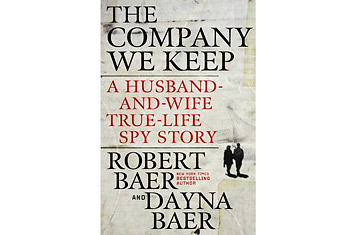
An exclusive excerpt from the new novel by Robert and Dayna Baer, based on a husband and wife true-life spy story:
Damascus, Syria, October 1990: Bob
When the Lufthansa plane comes to a stop in Syria's capital, Damascus, half a dozen passengers stand up — German businessmen, I'm guessing, trying their luck at selling the Syrian regime something. The rest of the passengers stay put. They're on their way to Jordan's capital, Amman.
Two men in overalls push a rickety stairway across the tarmac. It's late, and most of the lights are off in the squat terminal. I stay in my seat. I know how slow they are here.
As the stewardess starts to crank open the cabin door, the captain comes over the intercom. "Would everyone please retake their seats, and would Mr. Robert please come forward."
The Damascus passengers look at each other to make sure they've understood, and then sit back down, their cabin bags in their laps. I know what they're thinking: Damascus is an exotic place and anything's possible. But it's not a place where you defy authority.
This is clumsy. They should have met me at Immigration, pulled me aside. But I hurry down the aisle. In my Levi's, V-necked sweater, and T-shirt, I don't look like even a shady businessman. All I can think is that I'm happy Lufthansa wrote down my first name for my last when I boarded in Frankfurt.
A man in a grease-stained blue smock stands at the bottom of the stairs and motions for me to come down and get into his beat-up Syrian Air Peugeot station wagon. I climb into the passenger seat, Mr. Blue Smock behind the wheel. He doesn't say a word as we slowly round the terminal, pass through a cargo gate held open by two Syrian soldiers, and pull up beside three identical black BMWs. A man standing near the middle car opens the rear door, takes my bag, and I get in. In the backseat is a man I know from Geneva — a friend of Ali, the one who set all this in motion. The man shakes my hand, welcoming me to Damascus. To the driver he says, "Yallah," Arabic for "let's go."
It's a little after midnight.
Once we're out of the airport, the three BMWs take off. They've got to be doing ninety, maybe a hundred. We slow down when we come to Damascus, but then, once past the city center, pick up speed again on the Beirut highway. My Geneva friend doesn't say anything, and I look out the window at the passing darkness, thinking about the chain of events that got me here.
Ali had once been a Syrian general. Now he's a very rich businessman with a grand villa above Cannes, a spectacular Geneva mansion, and elegant stopping-off spots all around the world. I'd phoned him out of the blue in Geneva two years earlier, not expecting he'd give me the time of day. Almost ever since, he's been tutoring me on the nuances of Syria and its secretive president, Hafez al-Asad.
Ali's own village had been within walking distance of Asad's. His father knew Asad's father well. Ali said that unless I understood these small villages in the Alawite mountains, I could never understand Asad's Syria. "It's all relationships, loyalty, trust."
Only a few days earlier, I'd stopped by Ali's Geneva place just as the news arrived that the American embassy in Beirut was closing because of a flare-up of fighting in Lebanon — and Syria's threat to intervene with its army to stop it. Ali sighed, saying a renewal of Lebanon's civil war was in neither America's nor Syria's interest. It was rare that our two countries shared a common interest, he said. This was one such time.
Ali explained to me something I already knew: that the man intent on dragging Lebanon into a new civil war was General Aoun, a Maronite Christian and the former commander of the Lebanese army. As we spoke, Aoun was trying to enlist his fellow Christians in an all-out war against Syria. In particular, Aoun wanted the backing of the commander of the Lebanese Forces, a Christian militia. Aoun had told the Lebanese Forces commander that the United States fully backed him. It wasn't true, but, as I told Ali, there wasn't anything the United States could do about it now because we no longer had an embassy in Beirut to tell the Lebanese Forces commander differently.
Ali asked me if I'd go to Lebanon to tell the Lebanese Forces commander that Aoun was a liar. He'd believe an American official. At first I didn't think Ali was serious. The airport was closed, and the Syrian border tricky to cross. But Ali said he could arrange it. He'd been true to his word.
Sometime after one in the morning, we begin to ascend into the mountains between Syria and Lebanon. At the border, the convoy veers to the right, onto the military road. A soldier watches us silently. As soon as we're through, I turn around and see him closing the gate behind us.
The Lebanese side of the border is empty, a no-man's-land, and now it's a straight shot through the Biqa' Valley. At a little after 2:00 a.m, we start up a narrow road into the mountains. We go only half a mile when the first BMW stops, and my traveling companion finally breaks his silence. He tells me he'll soon leave me, and a Captain Walid will take me the rest of the way.
